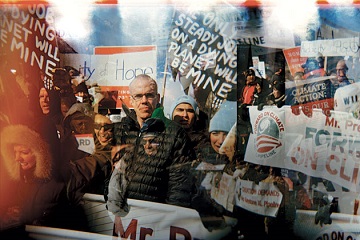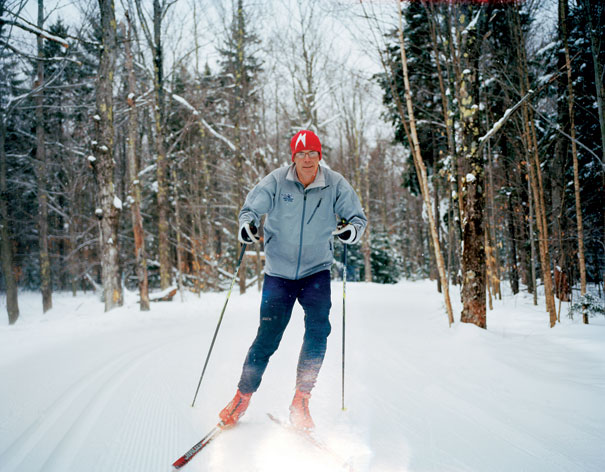Bill McKibben's Battle Against the Keystone XL Pipeline
 Every month, Bill McKibben gets dozens of e-mails from pseudo-scientists—or perhaps actual scientists, for all he knows—describing plans to build perpetual motion machines. The senders want McKibben to help them secure financing to build these contraptions, which they claim will solve the world’s energy needs and save the planet. He took the first few of these requests seriously enough to at least ponder before deleting. Now he gets so many he doesn’t even read the descriptions or business plans, though he can’t shake a certain nagging guilt. “My heart breaks a little each time,” he says. “What if someone has actually figured it out?”
Every month, Bill McKibben gets dozens of e-mails from pseudo-scientists—or perhaps actual scientists, for all he knows—describing plans to build perpetual motion machines. The senders want McKibben to help them secure financing to build these contraptions, which they claim will solve the world’s energy needs and save the planet. He took the first few of these requests seriously enough to at least ponder before deleting. Now he gets so many he doesn’t even read the descriptions or business plans, though he can’t shake a certain nagging guilt. “My heart breaks a little each time,” he says. “What if someone has actually figured it out?”It’s precisely because global climate change is such a huge, complex, and costly problem that McKibben, 52, has become a tribune for those trying to solve it. Formerly a magazine journalist and writer of ruminative books about the environment and other issues, he’s now, at least in the U.S., the environmental movement’s most influential spokesman. As the founder of the advocacy organization 350.org, McKibben has spent the last five years traveling the world to raise awareness about climate change, leading acts of civil disobedience and urging academic institutions to divest their portfolios of stock held in fossil-fuel companies. He didn’t seek the role, nor does he particularly relish it. If he could, he would retreat to his solar-paneled house in Vermont tomorrow to write more books. But time, McKibben and the best scientists insist, has run out.
McKibben’s message is blunt: The planet is warming faster and changing more rapidly than expected. For the past 10,000 years, the number of carbon particles in the earth’s atmosphere had never exceeded 275 parts per million. Climate scientist James Hansen, the man who first testified to Congress about the perils of global warming back in 1988, calculated the level at which the earth will drastically change to be around 350 ppm. In his 1989 book, The End of Nature, McKibben predicted that the planet would hit that number sometime around 2050; it turns out we blew past it back in 2007. In other words, the global crisis isn’t coming—it’s here.
It’s fallen to McKibben to assume the role of America’s leading “professional bummer-outer,” as he says. He tours the country explaining in clear, scientific terms how we are all, to some degree, screwed. It will no longer be enough to merely switch to more-efficient light bulbs or drive hybrid vehicles or swap natural gas for coal. Instead, McKibben believes that Americans have no choice but to end their consumption of cheap, carbon-producing fuels—immediately. So he’s waging an all-out campaign to prevent the biggest and most powerful fossil-fuel companies—“the richest industry there ever was,” he says—from extracting the estimated 2.8 trillion tons of carbon sitting in the world’s proven oil, gas, and coal reserves. If even one-fifth of that is actually extracted, refined, and burned, global temperatures will increase another 1.2 degrees. The climate impacts of such a rise may be civilization-altering.
His decision to bypass Washington’s cadre of environmental policy wonks and create his own grass-roots movement to take on corporate interests has echoes of the pro-environment populism of Teddy Roosevelt. Yet in choosing this fight, McKibben is also arguing against a notion that nearly every politician and corporate officer agrees on: that growth is good. He’s emerged as a self-proclaimed threat to the American way of life, so much so that men like Rex Tillerson, ExxonMobil’s (XOM) chief executive officer, label him a “purveyer of fear.”
The gut-check issue for McKibben and his supporters—thousands of whom turned out for a mass demonstration in Washington, D.C., on Feb. 17—is the Keystone XL pipeline, a 3,400-mile pipe proposed by oil infrastructure company TransCanada (TRP) that will allow crude oil extracted from the tar sands of Alberta, in southern Canada, to be refined on the Gulf of Mexico. The pipeline, which will cut through at least six American states, will facilitate the extraction and release of 240 billion tons of carbon, roughly enough to take us halfway to the 2-degree Armageddon point. McKibben’s argument—widely shared by climate scientists like Hansen and environmental groups like the Sierra Club—is that this carbon must stay in the ground. Because the pipeline crosses an international border, the authority to build it rests not with Congress but with the president, making this decision a unique opportunity for a world leader to strike a blow against global warming.
The showdown over Keystone is a mismatch, and even people sympathetic to McKibben’s efforts wonder if he’s picked the right battle. In one corner stands the richest industry the world has ever seen, and in the other, a wiry, middle-aged author who pretty clearly doesn’t want to be in the ring at all. But McKibben will tell you he has 64 percent of the U.S. population (the number, according to a recent Duke University survey, that believes in government regulation to curtail greenhouse-gas emissions) on his side, plus the passion, creativity, and spirit of the environmental movement. “It’s not going to be money,” McKibben says. “The other side is always going to have all the money. We have to use the currencies we do have.” He believes the paralysis that has overtaken the American political system will, over time, yield to common sense about the climate. The arc of the physical universe, on the other hand, is short, and it bends toward heat.
Writing a story about Bill McKibben, you become acutely aware of the hundreds of pounds of fossil fuels you are consuming on your way to meet him: the car to the airplane, the airplane, the rental car from the airplane. McKibben is well aware of the same contradiction in his own life and can find no way to reconcile the demands of his role as global speaker on behalf of the environment with the vast amounts of carbon his travel emits. “One of the great ironies of my life is that I have a carbon footprint the size of a small Indian village,” he says.
My drive up to McKibben’s house in central Vermont coincides with the first lashes of Winter Storm Nemo, an extreme climate event for coastal New England. Pransky, a half-labrador, half-poodle mutt, leaps through the 8 inches of snow that have already stuck before Bill emerges, dressed in a Middlebury College ski team jacket—he’s a faculty consultant to the cross-country team—and zip-up black sweater. In his wire-frame glasses and short gray hair, and with his measured, gravelly voice, he looks and sounds like a combination of Agent Smith from the Matrix movies and Henry Fonda from The Grapes of Wrath.

McKibben was born in Palo Alto, the oldest of two boys. His father, Gordon, was a technical writer for the Stanford Research Institute before joining the Wall Street Journal and, later, the staff of Businessweek. McKibben spent his teen years in Lexington, Mass., where he wrote sports stories for the local newspaper and gave tours of Revolutionary battlefields. “I’m basically a patriot. My default is that American democracy is the greatest invention of the world. So to be forced to realize that on the most important issue we’ve ever faced, it’s failing—that’s a hard realization.”
In college, McKibben was editor of the Harvard Crimson before joining the New Yorker as a staff writer straight out of college in 1982, where he was “the youngest person around by a fairly large margin.” He met his future wife, writer Sue Halpern, around this time and was on course to live a different kind of life, a mandarin of New York’s media class. His course changed after he wrote a story for the New Yorker in which he tracked down where everything in his apartment was made.
“In those days, the New Yorker had unlimited amounts of money,” says McKibben, allowing him to travel to Brazil to look at where Consolidated Edison (ED) was getting low-sulfur oil, to hydroelectric plants inside the Arctic Circle, oil rigs in the Gulf of Mexico, and uranium mines in the Grand Canyon. “It was a pretty good piece,” says McKibben, “but more importantly, it was my introduction to the idea that we actually live in a physical world.”
He left the magazine, moved to the Adirondack Mountains, and went to work on The End of Nature, a book that describes the impacts of global warming as a fundamental transformation of the earth itself. It became one of the seminal texts of the climate-change movement, laying out the scope of the problem and describing humanity’s moral obligation to respond. It was McKibben’s view, until quite recently, that his role was simply to explain the severity of the crisis. “I was 27 when I wrote The End of Nature, so my theory was that people will read the book, and then they will change, and policy would change, which is not the way it works.”
He’s written 11 more books, on topics as diverse as cross-country skiing and the commercialization of Christmas. He returned to climate change repeatedly, both because of his fascination with the subject and his increasing concern that the planet was warming faster than previously estimated. Yet he didn’t see himself as an activist. The environmental movement seemed to have a leader in former Vice President Al Gore, whose documentary film An Inconvenient Truth had raised more awareness of the issue than McKibben’s books ever could. Gore and others believed that political forces would eventually drive the policymakers in Washington to do the only logical thing: ward off the disaster by reducing U.S. dependence on fossil fuel. “But nothing happened,” McKibben says. “It’s been a perfect, bipartisan, 25-year history of doing nothing. … What I never could have predicted was that one entire political party was going to give itself over to climate-change denial.”
In 2006, a trip to Bangladesh convinced McKibben to turn words into action. He’d been afflicted with Dengue fever and fell violently ill in a friend’s house in Dhaka where he had been researching a book. The disease, spread by a mosquito species whose range had expanded because of a hotter, wetter climate, left him feverish but also pondering the impact of global warming on the world’s poor. “These people had done literally nothing to cause this, yet they’re paying the price.”
You can return to the main Market News page, or press the Back button on your browser.

